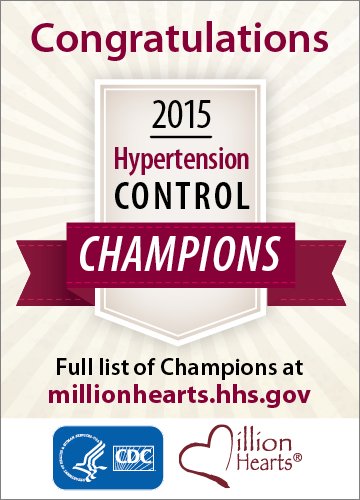
A member of the High Blood Pressure Collaborative was nationally recognized for its success achieving high rates of blood pressure control for its patients.
Unity Family Medicine at St. Bernard’s was among 18 champions recognized for having high blood pressure control rates of more than 70 percent by the Million Hearts national initiative. The 18 champions ranged from small practices to large health care systems in the U.S.
“Clinicians are our first line of defense against the hundreds of thousands of deaths caused by high blood pressure each year,” said Dr. Tom Frieden, director of the Centers for Disease Control and Prevention, which co-leads the Million Hearts initiative with the Centers for Medicare and Medicaid Services. “We applaud the 2015 Champions and hope other health care teams learn from these successes and save even more lives.”
Nearly 1 in 3 American adults has high blood pressure, a leading cause of heart disease and stroke. Nearly half of adults with high blood pressure do not have their condition under control. Even more alarming, millions of Americans have high blood pressure that is undiagnosed or untreated. High blood pressure may also contribute to the development of dementia.
Rochester Regional Health System’s Unity Family Medicine at St. Bernard’s participates in the local High Blood Pressure Collaborative, which is spearheaded by the region’s largest employers, hospitals and health insurance companies and managed through a partnership between the Greater Rochester Chamber of Commerce and Finger Lakes Health Systems Agency.
The collaborative’s work, along with other important local health improvement initiatives, has led to a 12.8-percent improvement in high blood pressure control in Monroe County over the past five years, an increase in the control rate from 62.7 to 70.7 percent.
However, there is still work to be done. Residents in the city’s high poverty neighborhoods are 18 percent less likely to have high blood pressure in check than are individuals living in more affluent communities, clinical data show. The 2012 Monroe County Adult Health Survey reports that African Americans are 1.6 times more likely and Latinos 1.1 times more likely than whites to have the chronic illness.
By recognizing the Champions’ performance and sharing their lessons learned, CDC aims to help other health care professionals achieve the same success in communities nationwide.
“Health care teams can follow our Champions’ lead to take steps to identify patients in their practice who are at risk for or who have high blood pressure and connect them to the care they need,” said Wright, the executive director of Million Hearts, which the U.S. Department of Health and Human Services launched in 2011 to prevent 1 million heart attacks and strokes in five years.
All Champions achieved control rates of 70 percent or greater for their adult patients by using a variety of approaches, including:
- Making high blood pressure control a priority
- Using evidence-based treatment guidelines and protocols
- Using health care teams to increase the frequency of contact with patients
- Implementing consistent, strategic use of electronic health records that include clinical decision support tools, patient reminders, and registry functionality
- Staying engaged with patients by offering free blood pressure checks and implementing the use of a patient navigator or care coordinator

